- Home
- Gavin Chappell
Murder in Hadrian's Villa
Murder in Hadrian's Villa Read online
Murder in Hadrian’s Villa
GAVIN CHAPPELL
Copyright © Gavin Chappell 2016
Cover art by Luis Garcia
All rights reserved. No part of this book may be reproduced or transmitted in any form or by any electronic or mechanical means, including photocopying, recording or by any information retrieval system, without the written permission of the publisher and author, except where permitted by law.
The right of Gavin Chappell to be identified as the author of this work has been asserted by him in accordance with the Copyright, Designs and Patents Act 1988.
Maps provided under license from Wikimedia Commons.
Published by Schlock! Publications 2016
ISBN-10: 1530524903
ISBN-13: 978-1530524907
This book is a work of fiction and any similarities to actual persons and/or places are purely coincidental.
Schlock! Publications
www.schlock.co.uk
In the same series:
On Hadrian’s Secret Service
By the same author:
Crocodile and Leopard
The Man Who Sold the Roman Empire
—1—
Tibur, 7th April, 122 AD
The worn old paving stones smacked to the measured tread of military issue sandals, the clink of equipment drifted on the slight breeze, burnished breastplates winked and glittered in the sunlight, and the crests of their helmets stood proud as a column of heavily armoured Praetorian guards marched through the tranquil countryside. It was a warm spring day and the guards were proceeding smartly down the Tiburtine Way, some miles outside Rome. The sky was a deep summer blue, and the olive groves and vineyards on the nearby slopes brought a musty, delicious scent to the nostrils of the young tribune riding at the head of the marching men.
The turnoff for the Imperial Villa came into view, a track leading between laurel trees to the right of the road.
The chief centurion was riding beside the tribune. ‘First time you’ve been on duty at the Villa, sir?’
Gaius Flaminius Drusus shrugged. ‘My first time as a Praetorian, First Spear,’ he said. ‘Last year I had other duties here.’
Chief Centurion Messalus—“First Spear” of Flaminius’ Praetorian cohort—nodded gruffly. ‘I remember,’ he said. ‘I was there.’
Flaminius recalled the events of that day, several months ago, when he had rescued the Emperor Hadrian from the assassin’s blade after a long journey from the wilds of Caledonia, half the empire away. It had been there that he—at the time, an auxiliary tribune of horse in the doomed Ninth Legion—and his grizzled colleague, Commissary Centurion Julius Probus, had first got wind of the plot.
Outlawed and on the run, accompanied by a barbarian warrior woman, Flaminius had forced his way to the emperor’s side through the labyrinth of tunnels below the grounds of the Villa, Hadrian’s so called Underworld. He’d tangled with numerous Praetorians in the process; perhaps even his new comrade if Messalus had been on duty that day.[1]
But in the hour of triumph had come terrible news—on the frontier, his legion, the Ninth, had been overwhelmed by the forces of the Caledonians and annihilated. Flaminius was lucky he had been in Italy at the time. Nightmares still troubled him. Despite his newfound status as a hero of the empire, however, he had been a man without a commission. But that had been soon to change.
With the aid of Centurion Probus, a highly influential man despite his lowly rank, Flaminius had been seconded to the Praetorian Guard, with the rank of tribune. Until now his cohort had remained stationed at the Praetorian camp just outside Rome. In the absence of the emperor—currently shoring up the defences in Britain in the wake of the loss of the Ninth—Flaminius’ duties had been light, confined to glorified sentry-go at the Imperial Palace in Rome.
Now that it was spring, the Empress Vibia Sabina and her entourage had decided to leave behind the city and its corruptions and its smoke and breathe the clean air of the countryside, here in the splendour of the Imperial Villa. The guard was changed every month, a cohort at a time, and now Flaminius’ cohort was due to take over.
‘You’ll get a hero’s welcome from the empress,’ Chief Centurion Messalus added. ‘She’s not forgotten what you did for the emperor.’
Flaminius’ only impression of the empress had been of an austere, dignified woman, as icy and distant as the Apennine peaks, showing all the emotional depth of a marble statue. The most he knew about her was that the Villa into whose grounds they were now marching had been her own property. The new buildings now appearing among the trees were her husband’s work, but the site itself was an inheritance from her family.
‘Speaking of the emperor,’ Flaminius commented as they continued to pass lawns and hedges and groves, ‘I’m surprised her imperial majesty hasn’t gone out to Britain with her husband. It looks like he’ll be staying in the province some time while the trouble with the tribes is dealt with.’
He had heard was that the Caledonians themselves were quiet, but the Selgovae were up in arms, as were the Brigantes. This last shocked him; when he had been in the country, the Brigantes had been staunch allies of Rome. His warrior woman friend Drustica belonged to a Brigantian sept. He worried for her safety.
The First Spear gave him a weary look. ‘You’re new to the Guard,’ he said. ‘You’ve not seen much of what goes on behind the scenes, nor heard the rumours, it seems. The emperor was compelled to marry by his predecessor, Trajan of Sacred Memory. It was Hadrian’s marriage to her imperial majesty that secured the succession for him, although some senators thought other people were more suited for the job.’ Chief Centurion Messalus looked about him darkly, and leant across his horse. ‘Some people claim that the marriage has never been consummated. His imperial majesty is too fond of young boys. Rumours fly round the barracks that the emperor finds comfort with catamites and sphincter artists.’
Flaminius reined his horse, and the cohort came to an abrupt and uncoordinated halt behind him—not paradeground style at all. He gestured curtly to his chief centurion and together they trotted to one side.
In the shade of a laurel, he hissed: ‘I’d not have thought a man of your standing would be a scandalmonger, First Spear! I know what loose talk you get in barracks rooms and the officers’ mess, I’ve served with the legions. But this is the Praetorian Guard. We’re the best. We’re above that kind of thing.’ He swallowed. The older man gazed back at him, unimpressed, verging on the insolent. ‘Any more of this nonsense and I’ll have you demoted to the ranks and sent to the frontier.’
‘Very well, tribune,’ Chief Centurion Messalus replied formally. ‘Reprimand understood and accepted. Shall we continue?’
After a long pause while he studied the man—whose aplomb had not apparently been affected by the rebuke—Flaminius nodded. They trotted back to the column, the centurion barked an order to the guards, and they began their progress again.
Even when the main Villa complex appeared among the trees, Flaminius still felt shocked to have heard the hard bitten centurion gossiping like a bitchy dancing girl or a eunuch chamberlain.
He didn’t want to seem like a prig. Flaminius had indulged in vicious gossip with his fellow tribunes in the mess at Eboracum[2] often enough; even mentioned a few “lady’s” names. That was different, though. Back then he’d been young and silly. He’d grown up quickly when he found himself caught up in the cloak and dagger world of the imperial secret service. Chief Centurion Messalus, on the other hand, was practically his father’s age.
Like many centurions, Messalus was a thickset man in his middle years, whose grizzled hair and bald patch was apparent on the few occasions when he took off his plumed helmet. A tough discipli
narian, he’d beaten bloody a few insubordinate backs in his time with the legions, Flaminius was sure. Discipline in the Guards, however, tended to be comparatively lax. Seldom were these elite soldiers required to face the barbarian in the field; spit and polish was their lot, guard duty in the palace and other imperial dwellings—Hadrian’s Villa in particular. It seemed that the cattiness and intrigue of the palace servants had infected at least one of its number. Flaminius would have to keep an eye out for this kind of ill-discipline.
And yet, another part of the tribune was more than a little intrigued. If he was to succeed in his mission, his secret mission, he would need blabbermouths like the First Spear. He was hunting for information, after all. With that thought uppermost in his mind, he led his men into the outer peristyle of the summer palace, where another division of guards awaited them.
The summer palace was the residence of the emperor and his retinue during the spring and summer months, a white stuccoed edifice with red tiles on its roof and marble statues adorning its box hedged, gravel pathed outer peristyle. The walls of this edifice were less massive than those of the winter palace that stood nearby. Neither of them, however, were to be confused with the Imperial Palace in Rome, the august residence that looked down on the Roman Forum haughtily from the Palatine Hill; that was an even more grandiose structure of rather longer duration.
The tribune in command saluted Flaminius from horseback. ‘Praetorian Tribune Aulus Fabricius Cotta,’ he said, ‘yielding command to Praetorian Tribune Flaminius.’
Fabricius Cotta was a tall, thin fellow with watery blue eyes, who held his plumed helmet under one arm and his long nose slightly raised as if he could smell something unpleasant. Flaminius had seen him in the tribunes’ mess back in the Praetorian camp, but they’d never spent much time together.
‘Thanks, Fabricius Cotta,’ he said with a grin. ‘I’ll see you and your men back at the camp. Enjoy the fleshpots of Rome, friend. I’ve kept those Subura whores warm for you.’
Tribune Fabricius Cotta looked down his nose at Flaminius. ‘No doubt,’ he lisped in distaste. ‘I’d expect as much from a man who rose from the ranks.’
Most Praetorian tribunes had obtained their positions through family influence, not by deeds of derring-do like Flaminius—he had never been a ranker, whatever Cotta said, but tribune of auxiliary horse, his rank in the Ninth Legion, was about as lowly as a commissioned officer could get. It seemed Fabricius Cotta was jealous of his fellow officer’s rise.
With no more than another salute, and a ‘Report to barracks,’ Tribune Fabricius Cotta trotted out from the outer peristyle, his men following smartly.
‘You’ve not made a friend there,’ Chief Centurion Messalus commented in a low voice. ‘Time we reported to barracks, like the man says.’
Flaminius gritted his teeth. ‘Thank you, First Spear,’ he said.
They both dismounted, flinging their reins to slaves who appeared quietly from the colonnade. Now on foot, Flaminius led them at a quick step from the peristyle and in the direction of the Praetorian barracks, whose location he remembered from his previous, rather more dramatic visit.
They passed the summer palace, marching through its gardens, which consisted of laurel groves, wide lawns and gravel paths, then along a ramparted wall where the hill sloped down towards the north. On the slope below, amid trees, was a small amphitheatre. Flaminius thought he could hear the distant roaring of lions drifting from behind its white walls.
As they crossed a lawn crossed by tree lined paths, he saw several handmaidens playing catch with a discus, dressed in brief garments, colourful thongs and breast bands, as if they were at a women’s gymnasium. Turning to see the Praetorians march past, they shrieked, several scurrying to hide themselves behind bushes, covering their mouths as they giggled.
They resembled a collection of exotic jewels, Flaminius thought; beauties from every corner of the empire and beyond; one was a blonde haired maiden who could only be from Germany or further north, another had the ebon skin and thick curling hair of an Ethiopian, and a third had the olive skin and large eyes of a Syrian or Judean.
One bolder girl stepped out from among the giggling crowd. ‘Gaius?’ she said. ‘Surely it’s my Gaius—Gaius Flaminius Drusus , I should say!’
The First Spear halted with a scowl, and told the men to avert their eyes from the athletic young women with an ‘Eyes forward!’ While his men stared woodenly forward, as if on parade, Flaminius stepped out onto the lawn. He held out his arms wide to hug the girl to his breastplate.
‘Medea!’ he exclaimed, drawing her back so he could study her. ‘Last I knew you were with your master in Britain. I knew Falco had come to Rome, but I hadn’t hoped to find you while I was on duty!’
‘On duty?’ she said. ‘What are you doing at Hadrian’s Villa?’
Her feline eyes were kohl rimmed, just as he remembered them, she drifted in a discreet cloud of Judean balsam, and her robes were best described as diaphanous. She was just as Flaminius recalled her from their last encounter, back in Eboracum.
‘I made the Praetorian Guard,’ he told her teasingly, with a wink and a gesticulation at his stolid faced companions, ‘without needing you to pull strings. Is your master visiting the Villa?’
‘My master?’ she said with a sniff. ‘Senator Falco’s ditched me. I’m a handmaiden of the Empress Sabina now.’
‘Is that so?’ Flaminius leant closer. ‘Tell me, have you heard anyone discussing the murder of Rufinus Crassus?’
‘The senator who tried to kill the emperor?’ Medea asked. ‘He died of a sudden distemper, they say.’
‘After I stopped his assassination attempt, yes,’ Flaminius murmured. ‘Medea, can you keep a secret? Between you and me, I’m investigating his death. Don’t tell anyone, will you?’
Her eyes widened. ‘How exciting! So you’re still working for Centurion Probus?’ But she shook her head. ‘No, I’ve heard nothing. Still, I’ll see what I can find out. Now quick, you’d better report to barracks or people will suspect something.
‘Please don’t mention finding us girls exercising so brazenly,’ she added. ‘The empress expects us to be supple and nimble, but she complains about immodesty if we exercise outside. I don’t know why. Your men turned their gaze, didn’t they?’
She darted away with her fellow handmaidens towards a side door to the summer palace. Much happier for the chance encounter, Flaminius signed to the patiently waiting Praetorians and led them onwards.
Meeting Medea here had been a lucky chance. Previously she had been concubine to Senator Falco, who Flaminius was certain had been part of the conspiracy against the emperor. Falco had been governor of Britain with three legions at his command, and on the murder of Hadrian by his fellow senator Rufinus Crassus, he would have led his troops south to Rome to seize power. But when Rufinus Crassus was found dead, the coup had come to nothing, and all had been overshadowed by the disastrous loss of the Ninth Legion in a Caledonian attack.
Falco’s involvement could not be proved, except by the unwritten testimony of a renegade druid who had overheard everything but died soon after reporting to Probus. Nobody admitted responsibility for Rufinus Crassus’ death, but someone had murdered him at night while he was a prisoner, unless this story of a convenient ‘sudden distemper’ had a shred of truth in it.
At least, now that Medea had entered the empress’ employment, Flaminius had a friend here.
Leaving his men to settle into their new duties under the watchful eyes of the lesser centurions, Flaminius went, accompanied by Chief Centurion Messalus, to report his arrival to her imperial majesty.
A short walk through the colonnade and across another garden took them to the summer palace. Two Praetorians accompanied them, to wait as sentries outside in the main portico. Imperial chamberlains led Flaminius and Chief Centurion Messalus into the presence of the empress herself.
The Empress Vibia Sabina reclined on a well upholstered couch in an airy, spacious atr
ium. Beside her was a rippling stone pool over which played a fountain and in whose waters darted fish. The shadows of the water rippled across a ceiling depicting a scene of fauns and nymphs in Arcadia.
She rose as the two guards entered, and greeted them.
A woman in her mid-forties, she wore a long green stola of rich linen, and her hair, on which lay a golden circlet, was in an elaborate, old fashioned coiffure. Her patrician face was grave, her eyes fierce and dark. Her downturned mouth suggested disapproval at these heavily armoured forms intruding into her tranquil dwelling. She had all the gravitas of a Roman matron and yet at the same time it seemed that beneath it was all the untamed passion of a barbarian. Flaminius could see that she was a formidable woman.
‘Welcome once again to my home, Tribune Flaminius,’ the empress said. ‘The saviour of my husband is always welcome. Please, not so formal. Sit.’
A little uncomfortable, Flaminius perched on a nearby couch. No such courtesy was extended to Chief Centurion Messalus, and with a nod he dismissed the man. The empress looked up as the centurion went to wait in the archway and Flaminius thought he saw them exchange glances, as if they were familiar with each other. The centurion must be a regular sight both here and at the Imperial Palace in Rome. Again Flaminius wondered if he had been here on the day of the assassination attempt.
‘I am so glad that such a hero has joined my husband’s guards,’ Sabina added warmly. ‘And so young! Most of the men who join the Praetorians are veterans from the legions. It’s refreshing to see a youth promoted so rapidly—but of course, you certainly deserve it.’ She paused, and added delicately, ‘I was so sorry to hear about your old legion, the Ninth.’
As Flaminius thanked her, voices came from within the palace and into the chamber strode a bald, bearded, armoured man in his late forties, wearing a splendid red cloak. He was talking to a stoop backed man a few years older, who wore the toga of an equestrian and carried a scroll under one arm. The armoured man carried a plumed helmet under one arm and as he came in he gave the empress a broad, frank grin and a sketchy salute, while his companion nodded deferentially. Sabina gave them a secret, amused smile, and glanced from one man to another.

 The Hadrian Legacy
The Hadrian Legacy On Hadrian's Secret Service
On Hadrian's Secret Service Murder in Hadrian's Villa
Murder in Hadrian's Villa The Sword of Wayland
The Sword of Wayland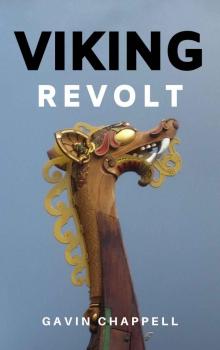 Viking Revolt
Viking Revolt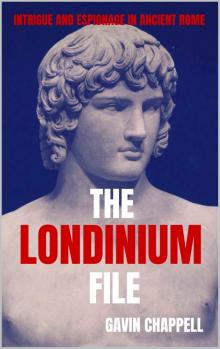 The Londinium File
The Londinium File The Gladiator Gambit
The Gladiator Gambit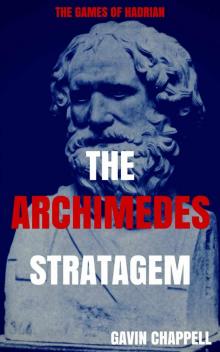 The Archimedes Stratagem
The Archimedes Stratagem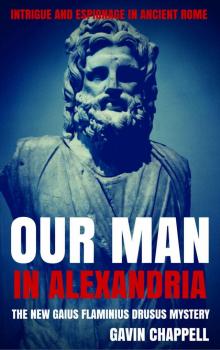 Our Man in Alexandria
Our Man in Alexandria Into the Void (The Dungeoneers)
Into the Void (The Dungeoneers) The Kingdom That Rome Forgot
The Kingdom That Rome Forgot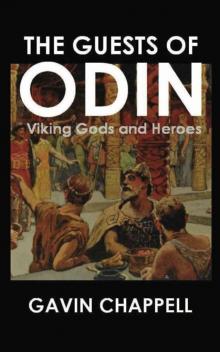 The Guests of Odin
The Guests of Odin